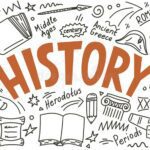At The Pochin School we believe that learning about the past and key historical events provides a valuable educational, social and cultural experience for our pupils. It helps them to develop an understanding of the world around them and how significant times and people have led to the world we have today. It develops their curiosity and investigative skills and encourages them to ask investigative questions.
In our History lessons, we aim to ensure that both our pupils’ substantive and disciplinary knowledge is built upon year on year.
Substantive Knowledge:
- Time
- People and Power
- Society
- Conflict (Key Stage 2 only)
Disciplinary Knowledge:
- Constructing the Past
- Sequencing the Past
- Continuity and Change
- Cause and Effect
- Significance and Interpretation
- Historical Enquiry
- Sources of Evidence
- Vocabulary
Enrichment Activities
At The Pochin School, we aim to bring the curriculum alive!
As part of our local history study, we have looked at the life and times of Richard III. We visited the museum in Leicester and took part in an archaeological workshop. We were also lucky enough to have one of the archaeologists who worked on the actual dig come in to talk to us!
We had a visit from the archaeologist who discovered Richard III – Matthew Morris. It was amazing to listen to what he had to day about ‘The Lost King’
Take a look at our Ancient Egyptian Day when the children in Years 3, 4 and 5 had a visit from Queen Cleopatra and her scribe, Sati. Throughout the day, the children experienced mummifying a pharaoh, market trading, pyramid building and storytelling!
The role of history in developing a broad and deep vocabulary is key. Teaching vocabulary in context is vital.
Initially, children need to develop a vocabulary that relates to the passage of time. This also links with Understanding the World in EYFS as well as to the mathematics curriculum which states that children in Key Stage 1 should be taught to ‘sequence events in chronological order using language, for example, before and after, next, first, today, yesterday, tomorrow, morning, afternoon and evening.’
Key Vocabulary for History Topics
Children also have vocabulary grids to support their understanding and introduction to new vocabulary acquisition. Please see below example:
Progression in Substantive Vocabulary
Awaiting
Family Projects
We encourage our children and families to work together on projects linked to our main curriculum focus of the half term. Here are some fabulous examples of what our children have done at home to consolidate their understanding for a recent topic on the Stone Age to the Iron Age:

